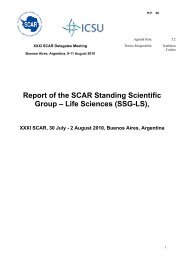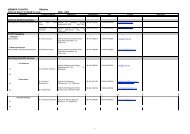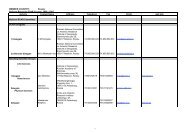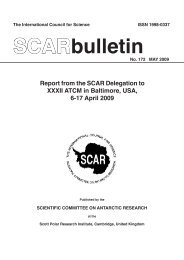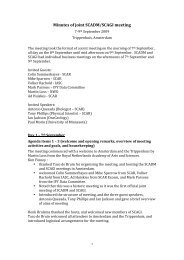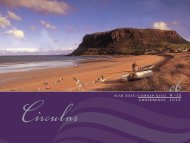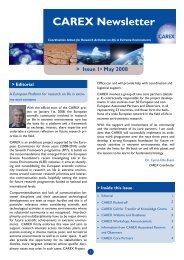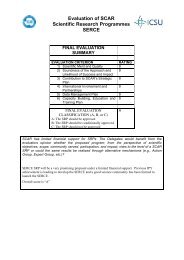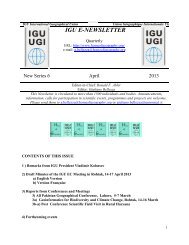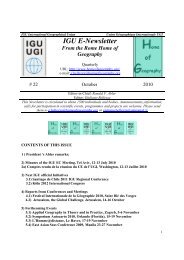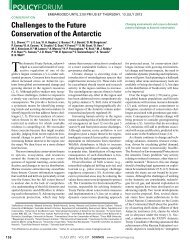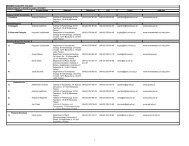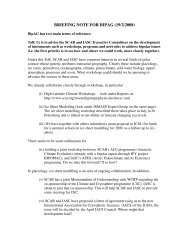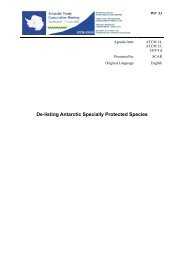SCAR Strategic Plan - Scientific Committee on Antarctic Research
SCAR Strategic Plan - Scientific Committee on Antarctic Research
SCAR Strategic Plan - Scientific Committee on Antarctic Research
Create successful ePaper yourself
Turn your PDF publications into a flip-book with our unique Google optimized e-Paper software.
<str<strong>on</strong>g>SCAR</str<strong>on</strong>g> STRATEGIC PLAN 2004–2010<br />
• buoy data (XXVI-5; XXVII-11; XXVIII-14),<br />
• bathymetric data (XXVI-3; XXVII-2; XVVIII-<br />
2),<br />
• geodetic and geographical data (XXVI-11; XXVII-<br />
3 and 5; XXVIII-3 and 5),<br />
• airborne gravity data (XXVI-12; XXVII-4);<br />
XXVIII-4,<br />
• ice core data (XXVI-13; XXVII-14),<br />
• magnetometer data (XXVI-14; XXVII-16),<br />
• geospace observatories (XXVI-15; XXVII-17;<br />
XXVIII-15)<br />
• upper atmosphere (XXVIII-17 and 18)<br />
• metadata records (XXVI-8; XXVII-19),<br />
Yet more efforts are needed to see that the required<br />
improvements come about.<br />
As a new initiative, he Life Sciences SSG is creating<br />
a Marine Biodiversity Informati<strong>on</strong> Network (MarBIN)<br />
to compile, disseminate, and integrate informati<strong>on</strong> <strong>on</strong><br />
<strong>Antarctic</strong> marine biodiversity for scientific, m<strong>on</strong>itoring,<br />
management and c<strong>on</strong>servati<strong>on</strong> purposes.<br />
6. Capacity Building and Educati<strong>on</strong><br />
To meet the objective of developing scientific capacity<br />
in all <str<strong>on</strong>g>SCAR</str<strong>on</strong>g> Members, especially with respect to younger<br />
scientists, and promoting the incorporati<strong>on</strong> of <strong>Antarctic</strong><br />
science in educati<strong>on</strong> at all levels, <str<strong>on</strong>g>SCAR</str<strong>on</strong>g> will take the<br />
following strategic approach:<br />
i. work towards building human and instituti<strong>on</strong>al<br />
capacity for <strong>Antarctic</strong> science by a variety of<br />
means;<br />
ii. promote educati<strong>on</strong> of the public and of students so<br />
as to increase awareness of the value of <strong>Antarctic</strong><br />
science; and<br />
iii. promote the development of <strong>Antarctic</strong> science<br />
through appropriate means.<br />
To meet these requirements, <str<strong>on</strong>g>SCAR</str<strong>on</strong>g> will begin by<br />
developing a capacity building and educati<strong>on</strong> strategy, in<br />
c<strong>on</strong>sultati<strong>on</strong> with COMNAP.<br />
6.1 Developing a Capacity Building and Educati<strong>on</strong><br />
Programme<br />
The <strong>Antarctic</strong> research programmes of <str<strong>on</strong>g>SCAR</str<strong>on</strong>g> Member<br />
nati<strong>on</strong>s vary greatly in their size and capacity. Some<br />
have scientific communities that are large, scientifically<br />
advanced and l<strong>on</strong>g standing. Others have relatively small<br />
and new <strong>Antarctic</strong> science communities that are still<br />
developing. To enable all in the <str<strong>on</strong>g>SCAR</str<strong>on</strong>g> family to participate<br />
in, c<strong>on</strong>tribute to and benefit from <str<strong>on</strong>g>SCAR</str<strong>on</strong>g>ʼs activities, it is<br />
incumbent <strong>on</strong> <str<strong>on</strong>g>SCAR</str<strong>on</strong>g> to work with appropriate agencies to<br />
help to enhance the research capacity of all of its Members<br />
and Associate Members. This requirement has become<br />
more pressing with the significant increase in <str<strong>on</strong>g>SCAR</str<strong>on</strong>g><br />
Membership in recent years.<br />
Until now, efforts at capacity building and educati<strong>on</strong><br />
have been ad hoc, and left largely to the inclinati<strong>on</strong>s of<br />
individual Member nati<strong>on</strong>s. To give a few examples,<br />
New Zealand has provided opportunities for Malaysian<br />
scientists to work at Scott Base, and runs a postgraduate<br />
certificate course and a Masters degree programme at<br />
Gateway <strong>Antarctic</strong>a. The UK and Germany provided<br />
initial <strong>Antarctic</strong> opportunities for Dutch scientists. The<br />
US has run and financially supported several postgraduate<br />
training courses at McMurdo Stati<strong>on</strong> that are<br />
internati<strong>on</strong>ally advertised and str<strong>on</strong>gly competed for.<br />
<str<strong>on</strong>g>SCAR</str<strong>on</strong>g> itself used the opportunity of the Prince of<br />
Asturias award in 2002 to offer 5 Fellowships creating<br />
new opportunities for young scientists. <str<strong>on</strong>g>SCAR</str<strong>on</strong>g> c<strong>on</strong>siders<br />
it desirable to c<strong>on</strong>tinue such a fellowship programme with<br />
funds attracted from external sources. This is c<strong>on</strong>sistent<br />
with an aspect of capacity building and educati<strong>on</strong> that is<br />
particularly important to all <str<strong>on</strong>g>SCAR</str<strong>on</strong>g> Members - the need to<br />
create the cadre of <strong>Antarctic</strong> scientists for the future. It is<br />
vital to engage the young, and to interest young scientists,<br />
everywhere, in <strong>Antarctic</strong> research.<br />
As a first step towards developing a capacity building<br />
and educati<strong>on</strong> strategy, <str<strong>on</strong>g>SCAR</str<strong>on</strong>g> XXVIII agreed to create a<br />
<str<strong>on</strong>g>SCAR</str<strong>on</strong>g> Capacity Building and Educati<strong>on</strong> Group. The Group<br />
should involve the Executive Director and report to the<br />
Delegates <str<strong>on</strong>g>Committee</str<strong>on</strong>g> <strong>on</strong> Outreach and Administrati<strong>on</strong>. A<br />
Vice President will carry the resp<strong>on</strong>sibility for the Capacity<br />
Building portfolio within the Executive <str<strong>on</strong>g>Committee</str<strong>on</strong>g>. <str<strong>on</strong>g>SCAR</str<strong>on</strong>g><br />
should obtain advice <strong>on</strong> capacity building and educati<strong>on</strong><br />
from other practiti<strong>on</strong>ers in the field, notably from ICSU<br />
and its scientific committees.<br />
On the educati<strong>on</strong> fr<strong>on</strong>t, to interest young people in<br />
<strong>Antarctic</strong>a and its science it is desirable to c<strong>on</strong>tribute<br />
informati<strong>on</strong> about <strong>Antarctic</strong>a and its science to educators<br />
in as many countries as possible. This should be the<br />
resp<strong>on</strong>sibility of Nati<strong>on</strong>al <strong>Antarctic</strong> Programmes in their<br />
own countries. Ideally, those nati<strong>on</strong>al programmes should<br />
be made available to <str<strong>on</strong>g>SCAR</str<strong>on</strong>g>, so that <str<strong>on</strong>g>SCAR</str<strong>on</strong>g> can make<br />
them available to other countries through its web site. In<br />
due course, <str<strong>on</strong>g>SCAR</str<strong>on</strong>g> may wish to c<strong>on</strong>sider investing in an<br />
internati<strong>on</strong>al educati<strong>on</strong>al package that draws <strong>on</strong> examples<br />
from different Members.<br />
6.2 Nati<strong>on</strong>al Activities<br />
Capacity building and educati<strong>on</strong> by individual Member<br />
countries should be encouraged through Nati<strong>on</strong>al <strong>Antarctic</strong><br />
<str<strong>on</strong>g>Committee</str<strong>on</strong>g>s, while recognising that the necessary funding<br />
may come from nati<strong>on</strong>al agencies involved in <strong>Antarctic</strong><br />
research. The committees (and agencies) can work to<br />
develop and strengthen the effectiveness of their nati<strong>on</strong>al<br />
<strong>Antarctic</strong> regi<strong>on</strong> research programmes by:<br />
• determining needs and specifying what is required<br />
to satisfy those needs;<br />
• identifying and working to improve existing<br />
nati<strong>on</strong>al capabilities, including human skills and<br />
available technology;<br />
• identifying gaps in those capabilities, including<br />
inadequacies in present research and observing<br />
and data management systems, and working to<br />
correct them;<br />
• paying special attenti<strong>on</strong> to exploiting the<br />
opportunities offered by the increasing number<br />
15



